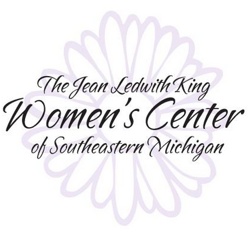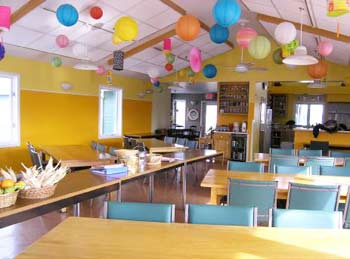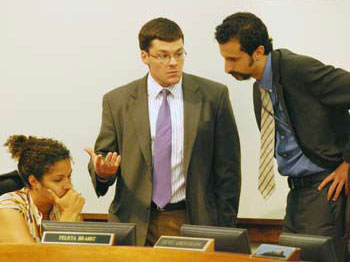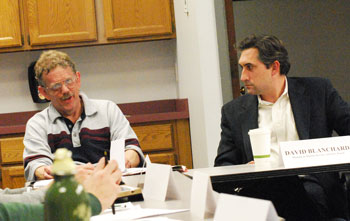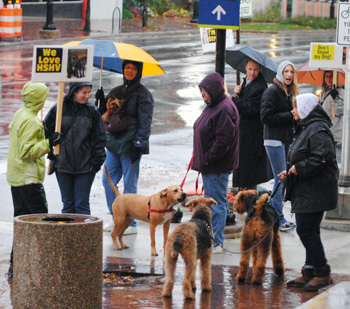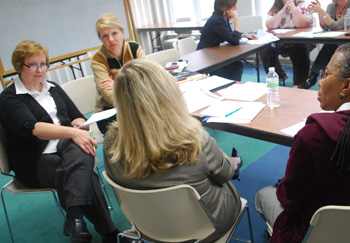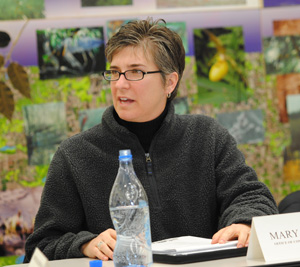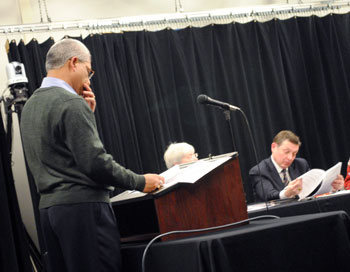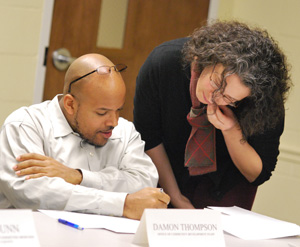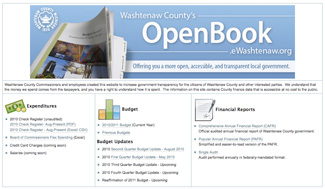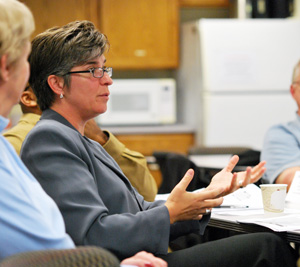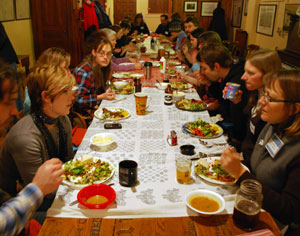Washtenaw County board of commissioners meeting (May 7, 2014): Two topics dominated a four-hour meeting: possible funding options for road repair, and an update on how the community is addressing homelessness.
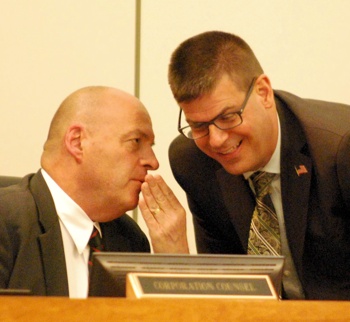
From left: Washtenaw County corporation counsel Curtis Hedger and commissioner Dan Smith (R-District 2). (Photos by the writer.)
Following a lengthy discussion, commissioners voted to set a public hearing about a possible countywide road millage. The hearing will be held at their meeting on May 21 so that the public can give input on a proposal to levy up to 1 mill for roads in 2014. The tax would be levied under Act 283 of 1909.
No final decision is expected at the May 21 meeting about levying a tax – although a resolution to levy a 1-mill tax is on the May 21 agenda for initial consideration.
Commissioners all appeared to support finding a way to secure more road funding, but some voiced concern about process and timing – especially because a tax under Act 283 would be levied without voter approval.
The May 7 discussion began when Dan Smith (R-District 2) brought forward a resolution that would authorize levying a 1 mill tax – under Act 283 – in December 2014. It would generate $14.34 million “to repair 2013–14 winter damage to the roads, streets and paths in Washtenaw County.” The board ultimately voted to postpone the resolution until May 21 over dissent from Alicia Ping (R-District 3).
During the wide-ranging discussion, Ronnie Peterson (D-District 6) expressed concern that the public hadn’t yet been informed about the Act 283 proposal. At the request of board chair Yousef Rabhi (D-District 8), Roy Townsend – managing director of the county road commission – had prepared a list of road projects that could be funded by an Act 283 millage, which was distributed at the May 7 meeting. Townsend and two of the three road commissioners – Barb Fuller and Bill McFarlane – attended the May 7 meeting, and Townsend fielded questions from the board.
Corporation counsel Curtis Hedger cautioned that Act 283 lays out a specific process, which calls for a presentation of proposed road projects at a meeting in late September or October, prior to the December levy. Responding to those concerns, Dan Smith noted that options might include passing a resolution this month or in June to indicate the board’s intent to levy the tax, then possibly using money from the general fund’s fund balance to pay for road work this summer. The fund balance would be reimbursed when the tax revenues are collected in December. Hedger pointed out a risk in that approach: If someone sues the county and a court issues an injunction, then the county might be unable to levy the tax – after already spending general fund dollars.
Conan Smith (D-District 9) supported the Act 283 tax. “I’m almost of a mindset of ‘Let’s do it’ – and if someone wants to sue us over it, you know, then when they file a lawsuit we can reconsider,” he said. Smith preferred the Act 283 levy over a ballot initiative that voters would be asked to approve, saying there are other funding proposals he’d rather put on the ballot – for public safety and human services.
The board discussion on this issue will continue at the May 21 meeting.
In other road-related items on the May 7 agenda, the board voted to accept the recommendations of a subcommittee that was appointed last year to explore options enabled by state legislators. The subcommittee had recommended not to make the road commission part of county operations, and not to make the job of road commissioner an elected position.
The May 7 meeting also included an update about the community’s approach to addressing homelessness. The briefing was in response to a board directive given to staff on April 2, 2014 to develop a plan for updating the county’s Blueprint to End Homelessness. The blueprint was adopted in 2004. The process of updating that plan is to be completed by Oct. 1, 2014.
Responding to information that there’s been an increase in people from outside of Washtenaw County coming to the Delonis Center shelter in Ann Arbor, Conan Smith cautioned against making that kind of distinction, saying it “dehumanized” people who are seeking help, regardless of where they’re from.
Mary Jo Callan, director of the county’s office of community & economic development, told Smith that his point was well taken. But she noted that unless the state asks other communities to provide something close to the level of support that Washtenaw County provides, “then it’s an issue of volume. I’m sorry, but it’s not about dehumanizing.” Ellen Schulmeister, executive director of the Shelter Association of Washtenaw County, noted that 96% of the shelter’s budget comes from local public funding, and the shelter was built for people who became homeless in Washtenaw County. She said it was her job “to hold that line.”
During the May 7 meeting, commissioners also gave initial approval to allocate funding to local nonprofits as part of a coordinated funding approach for human services, in partnership with several other local funders. The county is one of the original five partners in the coordinated funding approach. Other partners are city of Ann Arbor, United Way of Washtenaw County, Washtenaw Urban County, and the Ann Arbor Area Community Foundation.
This year, 105 applications were submitted by 50 local organizations totaling $8,732,389 in requested funding, according to a staff memo. A review committee recommended that 57 programs receive a total of $4,321,494 in available funding. Of that amount, the county is providing $1.015 million. Among the organizations that are being funded in this cycle are Corner Health Center, Interfaith Hospitality Network of Washtenaw County, Child Care Network, Catholic Social Services of Washtenaw, Food Gatherers and Legal Services of South Central Michigan. Several nonprofit leaders spoke during public commentary in support of this process, as did Ann Arbor city administrator Steve Powers.
In other action, the board appointed Ellen Rabinowitz as health officer for the Washtenaw public health department; passed a resolution calling for an increase in Michigan’s minimum wage to $10.10 per hour; and received a first-quarter budget update from the county’s finance staff. First-quarter projections tend to be conservative, because they’re based on only three months of the year, with limited evidence of budget trends. At this point, the 2014 general fund is projected to have a $70,230 shortfall by year’s end – with total revenues of $103,404,537 and total expenditures of $103,474,767. There is no planned use of fund balance for this year’s budget. [Full Story]




